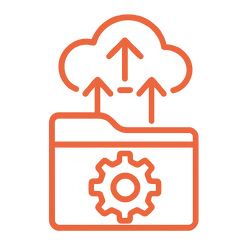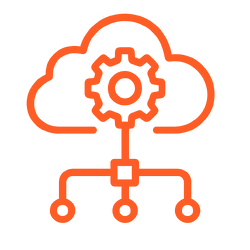As your teams rely on more SaaS, PaaS, and IaaS services, Microsolve consolidates these into a single, security-first environment with central visibility, governance, and support across all locations.
Streamlining Multi-Site Operations with Cloud Technology
Multi-site operations depend on consistent access to systems and data, so Microsolve designs and manages the right blend of public cloud platforms like AWS and Azure with private and hybrid cloud to keep every site secure and available.
Microsolve designs and manages multi-site cloud solutions for organisations across Sydney, NSW, and throughout Australia.

The Advantages of Cloud Computing: Why it's the Future of Technology
Modern technology like cloud computing, come with a range of benefits for your business. Cloud-based IT solutions can help you:
- Reduce your IT infrastructure costs
- Scale resources up or down as required
- Manage your IT costs with a fixed monthly price
- Manage IT services to agreed service levels (SLAs)
- Focus on building your business rather than managing complex IT systems and infrastructure
- Support an increasingly mobile workforce; and
- Minimise labour, training & infrastructure needs.

The Future is in the Cloud: What You Need to Know About Cloud Computing
Cloud computing is a revolutionary technology that allows you to access, store, and process your data and applications using a network of remote computers over the internet, rather than relying on a local server or your computer's hard drive.
This technology provides a safe and secure solution for managing and supporting your information technology needs, allowing you to consume IT resources like a utility based on usage, rather than having to build and manage the required IT infrastructure in-house.
There are three main cloud deployment options; most multi-site organisations use a mix of them
What Best Suits Your Business?

Public Cloud
Public cloud services are delivered over the internet using public bandwidth and resources. Customers only pay for the storage, bandwidth, or CPU cycles they use. Examples of public cloud services are:
- Amazon Web Services (AWS);
- Microsoft Azure;
- Google Compute Engine; and
- IBM/SoftLayer.

Private Cloud
A secure private cloud is exclusively created for your business, providing more control and management over your system. This allows you to ensure that the security and governance of your cloud solution are designed for your specific requirements.

Hybrid Cloud
Hybrid cloud combines private and public cloud services. It typically uses a private cloud foundation and integrates a mix of public cloud services, such as SaaS and IaaS, for flexible virtual resources and the latest applications. You can run sensitive workloads in your private cloud while using the public cloud for scalable, cost-effective infrastructure.
Whether workloads run in Azure, AWS, Google Cloud, or a dedicated private cloud, Microsolve aligns architecture, monitoring, and backup so your business meets compliance obligations without your leaders needing to think about infrastructure details.
Cloud service models: SaaS, PaaS, and IaaS

Software as a Service (Saas)
This is a software licensing and distribution model in which you subscribe to use software applications that are centrally hosted by a service provider or vendor. It is also called "on-demand software." Instead of installing and maintaining the software, you simply access it via the Internet, thereby freeing up your IT team from complex software and hardware management.

Platform as a Service (PaaS)
Platform as a service is a cloud-based platform environment in which you use a web-based platform on which to support the complete lifecycle of building and developing your cloud-based applications. In other words, middleware as a service for cloud-based solution development. PaaS enables you to develop, deploy, run, and manage web applications faster without the complexity of managing the underlying infrastructure.

Infrastructure as a Service (IaaS)
Infrastructure as a Service is a cloud infrastructure solution that provides computing resources such as servers, networking, storage, and data centre space on a demand basis. This reduces the need for you to invest in your own hardware and allows you to support the dynamic and ever-changing workloads of modern businesses.
Frequently asked questions
What is public cloud and when is it a good fit?
Public cloud uses shared infrastructure delivered over the internet, with customers paying only for the storage, bandwidth, and compute resources used; it suits organisations wanting rapid scalability without large upfront infrastructure costs.
How does a private cloud differ from public cloud?
A private cloud is built exclusively for one organisation, often in a dedicated environment, giving more control over security, configuration, and governance compared with shared public cloud platforms.
What is hybrid cloud and why do businesses use it?
Hybrid cloud combines private and public cloud environments so sensitive workloads can stay in a controlled private cloud while other applications take advantage of the flexibility and scale of public cloud services.
What are examples of public cloud providers?
Common public cloud platforms include Amazon Web Services (AWS), Microsoft Azure, Google Compute Engine, and IBM/SoftLayer, each offering a wide range of compute, storage, and platform services.
How do SaaS, PaaS, and IaaS support multi-site operations?
SaaS delivers centrally hosted applications over the internet, PaaS provides platforms for building and deploying cloud-based applications, and IaaS offers on-demand infrastructure resources so multi-site businesses can scale and support changing workloads without owning hardware.
Plan your multi-site cloud roadmap
Discuss your current cloud mix, risks, and performance with Microsolve’s cloud specialists. Get a clear, practical plan for public, private, and hybrid cloud across every site.
Explore Managed IT, Cyber Security, and Consulting Services — all delivered by Microsolve.
